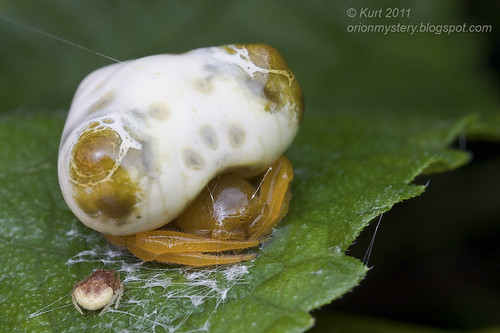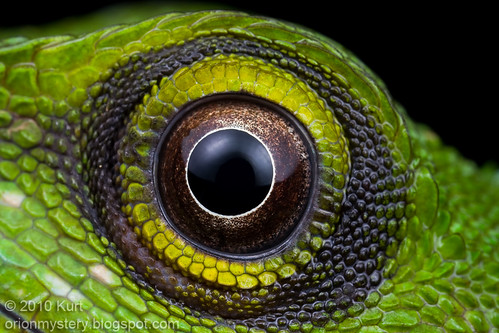Officially, it wasn't my first night macro anymore. Tried it when i was at Endau Rompin. But this time it was together with our usual macro gang. I also mentioned about a secret weapon
here.
If you are shooting full flash, with typical setting of 1/200, F11, ISO100, and flash (from your speedlight or dedicated macro flash) on, there is really no difference whether it's day or night, rain or shine, since your speedlight will be providing all the light needed anyway.
Basically, it wasn't any different from the usual day time macro, except you'll definitely need a flashlight/torchlight on hand to look around and search for your macro subjects. Headlamp won't work, unfortunately, because it will get in the way when you try to peep through your camera's view finder. In other words, the headlamp will hit the battery compartment of your speedlight/macro light. Unless, of course, your camera's speedlight is not mounted on the hot shoe.
Having said that, you can still wear the headlamp but adjust it slightly off center i.e either to the left or right, so it won't get in the way of your hotshoe mounted speedlight.
Do get the best torchlight/flashlight you can get hold of. Mine is an
iTP SA2 Eluma LED Flashlight
. You will need it to illuminate your path and to find your macro subjects!
Edit: September, 2014: I have been using a
Fenix E25 
for a few months and loving it. It uses 2xAA batteries. There are four brightness settings: Burst: 260 lumens; High: 130 lumens (3:30 hrs); Medium: 55 lumens (10 hrs) ; Low: 8 lumens (72 hrs). I use mainly the medium setting i.e 55 lumens. Its tight/focused beam can shoot far and enable me to spot subjects some 10 to 20 feet away. Extremely handy for spotting bigger bugs / herps.
One thing worth nothing is that I compared my E25 with an E35 out in the field / jungle at night. Mine at 55 lumen setting and the E35 at 120 lumen. Surprisingly, I preferred the tighter / more focused beam of my E25, and found myself being able to see better with my E25 at 55 lumens as opposed to the E35 at 120 lumens.
If I were to upgrade, I would probably get the Fenix PD32. Again, I compared the PD32 to my E25. Both have tight /focused beams, but
Fenix PD32
offers higher lumens for longer duration, simply because it uses 1x18650 battery, which is equivalent to 4xAA.
You'll need a helping hand too once you have found a subject. You can try to shine the flashlight on the subject while attempting to focus and press the shutter, but it's much easier if you get a friend to help on the former.
Your torchlight/flashlight will have no effect on your overall exposure. To confirm this, well, just turn off your speedlight, and proceed to take a photograph of the subject illuminated solely by your torchlight/flashlight. The image captured should be totally black.
If your macro flash has built-in focusing light, then you're in luck. My MT-24EX Twin Flash< has just that and it really comes in handy. You can set the Custom Function #9 on your MT-24EX / MR-14EX so whenever you double tap the shutter button, the focusing light will come on and stay on for 20second or until you press the shutter, whichever faster.
You can also try adding a focusing lamp to your macro setup to aid in focusing. That way you don't need someone to help you shine light on your macro subject. Something like this:
A small flashlight/torchlight with adjustable angle

The small flashlight/torchlight attached to the macro rig. That's a
DIY Snoot Diffuser attached to a speedlight. A DIY Snoot Diffuser guide is
here.

Both images above courtesy of
Chee Wai.
You can also get a AA or AAA (even lighter) flashlight that comes with a clip. Just clip it onto your diffuser/rig and you'll be able to use it as your focusing light.
Fenix Ld02
is a good choice.
The flashlight/torch will have little or no effect on your overall exposure. To test if your focusing light is affecting your exposure, turn off your speedlight and take a shot, with the focusing light from the torch on. If you see total darkness, that means the focusing light from your torch does not affect the exposure. However, do not shine the flashlight/torch into the lens as it will cause glare.
You'll tend to find some different insects/bugs than what you'd find during day time. Best of all, it's much cooler at night! It's also much cooler and based on my limited experience, less mosquitoes too.
Wonderful creatures of the night that I have come across during my night macro outings :)
What do you get when you cross vinegar with macaroons? A vinegaroons! (whip scorpion)
 Merged
Merged from seven vertical images in CS5.

A harvestman that seems to glow in the dark. Probably newly molted.
Sandokanidae.

A harvesstman (
Sandokanidae) enjoying its escargot supper.

A Malaysian black and gold huntsman (
Thelcticopis sp. family
Sparassidae, Tube-dwelling spiders) and a daredevil yellow crazy ant! LOL. Huge spider, 25mm body length!

More tropical spiders
here.
Orange huntsman with egg sac

Mommy huntsman with her spiderings.

Check out a huntsman life cycle documentation
here.
Another huntsman spider. More tropical spiders
here.

A gorgeous green huntsman

A male and female Bolas spiders,
Cyrtarachne fangchengensis

You will find many frogs too at night. White lipped frog (
Hylarana labialis)

Cute little frog.
 Rhacophorus dulitensis
Rhacophorus dulitensis, Mount Dulit Treefrog, from
Danum Valley.

A ribbon worm,
Nemertea, trying to prey on a beetle

Pill roach

Beautiful brown lacewing Family: Hemerobiidae, Genus:
Micromus(?)

Sleeping bees.....I don't like to sleep alone :P


More bees and wasps
here.
A cute little lizard sleeping on a blade of grass :)

Another lizard on a different night.

Up close with a female angle head lizard (
Gonocephalus grandis) at night. More about this beautiful species
here.

Another sleeping lizard. They all wake up at the slightest disturbance!

Moss mantis,
Majangella sp., probably
M. moultoni. More Malaysian mantids
here.

Beautiful Fulgorid found on a tree trunk at night.
Penthicodes variegata

A really cool cockroach found in Gunung Gading National Park.


Trilobite beetle. More amazing Malaysian beetles
here.

Dragonfly portrait. So much easier to get close to at night.

Hairy and wet caterpillar, thanks to the heavy downpour before our night macro session.

Orange caterpillar

A mating pair of caddisflies. More bugs porn
here.

Branded Imperial butterfly and a yellow crazy ant.

The eye of a green crested lizard. No way you can get this close to one during day time!

Check out another type of gorgeous lizard
here.
Polyrhachis sp. ants with pupae, in between two leaves. Their hive must have been flooded by the heavy rain.

A beautiful moth. Yes, taken at night too. Don't let the background fool you.

Mud-dauber wasp (
Sceliphrinae; Chalybion sp.)

Sleeping blue bee
Thyreus sp.

Wasp portrait

Hawk moth caterpillar,
Sphingid. Merged from 6 images. Tutorial
here.

Moth.
Asota sp (Erebidae, Aganainae)
 Viciria sp.
Viciria sp. jumping spider with eggs, and then spiderlings. Life cycle documentation
here.

Beautiful katydid in camouflage mode.

Tumbling flower beetle....another skittish subject that I can approach only at night.

Fibre optic bug :D

Beautiful mirid bug

Cool Flatidae hopper, subfamily Flatoidinae(?)


